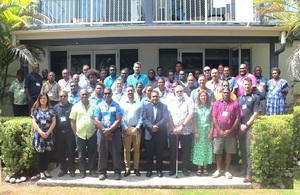Marine Pollution Incident Resilience workshop begins in Honiara
It brings together key stakeholders to enhance local and regional collaboration, communication and strengthen environmental response capabilities.

Group photo with the Supervising Minister of Environment for Solomon Islands, Hon. Rexon Ramofafia and British High Commissioner to Solomon Islands H.E Thomas Coward.
A four-day workshop on “Strengthening Marine Pollution Incident Resilience in the Pacific begins in Honiara, Solomon Islands today.
It is funded by the Ocean Country Partnership Programme (OCPP) an Official Development Assistance (ODA) programme under the UK’s Blue Planet Fund, in collaboration with the Secretariat of the Pacific Regional Environment Programme (SPREP).
The objective is to bring together key stakeholders to enhance local and regional collaboration, communication and strengthen environmental response capabilities for marine pollution emergency incidents in the Pacific.
It hopes to increase awareness and education around the risks and threats of pollution from marine activities in the Pacific (including Potentially Polluting Wrecks) by sharing global best practice, guidance, and knowledge.
Other workshop outcomes include enhancing knowledge and bridge gaps in contingency planning to respond to a marine incident and increase the capacity for local stakeholders to engage, assess and monitor potentially polluting wrecks.
Exploring actions to empower communities to further value and protect the marine environment and ensure participation in future actions on wrecks and marine pollution emergency response also forms part of the workshop outcomes.
It is also expected to enhance communication and collaboration between key stakeholders in the Pacific.
Delivered by OCPP, SPREP and Major Projects Foundation with support from the British High Commission in Honiara, a range of topics will be discussed.
They include from national contingency planning, roles and responsibilities, oil 7 chemical fate and transport modelling, vessel traffic analysis, risks and impacts from spills and potentially polluting wrecks and a table top exercise are among the various topics that will be covered.
PacPlan Project Officer, Paul Irving said:
SPREP is very proud to partner and work with the OCPP to assist Solomon Islands and other Pacific Island nations build marine pollution response preparedness and capability. The Pacific Marine Oil Pollution Contingency Plan (PacPlan) strongly encourages multilateral practical support like this workshop. Participants will leave better informed, and more capable to lead preparedness, response and recovery, should a marine emergency occur.
Held from 8 to 11 October at the Nahona conference, Heritage Park Hotel, the workshop will feature comprehensive discussions, knowledge sharing sessions, presentations and exercises.
Participants will be invited to exchange knowledge and ideas during the workshop exercises to encourage effective collaboration between stakeholders, the sharing of data, expertise and tools to bring together experiences, knowledge and expertise to learn together on how to better prepare for marine pollution incidents in the region.
Government, non-government, industry and academia are expected to attend including those who are involved in marine pollution emergency response or have an interest in the subject.
Delegates from Solomon Islands, Vanuatu, Fiji, Kiribati, Australia, Samoa and the United States are expected to attend the four days’ workshop in the capital.